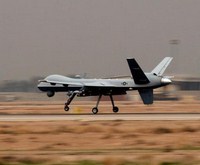Last week, a U.S. drone strike killed Hakimullah Mehsud, the leader of Pakistan's sociopathically violent Tehreek-e-Taliban (TTP) movement. The organization has murdered thousands, often relying on indiscriminant suicide bombs; has trained terrorists to attack the United States; and has remained closely aligned with al-Qaida. No one among the civilized will lament Mehsud's passing.
But because the United States did it, Pakistan has responded with outrage. Interior Minister Chaudhry Nisar Ali Khan called the U.S. action “a conspiracy to sabotage the peace talks” with the TTP—even though almost no one thinks those talks had much chance of success. Islamabad lodged a formal protest with the United States for violating its sovereignty. Another round of anti-American demonstrations flared across Pakistan.
All of this is nothing new. For several years, Islamabad has demanded that the U.S. stop drone strikes on Pakistani territory but has been unwilling or unable to exercise control over the parts of Pakistan used as sanctuary by violent extremists. Washington did scale the strikes back a bit but sees no viable alternatives that would punish terrorists and keep them on their heels. So the game continues.

